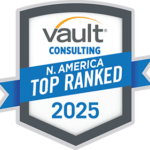Leading In5 is part of our commitment to helping leaders find creative ways to navigate and grow during these times of incredible post-COVID opportunity and phenomenal growth. This series features interviews with top business leaders from across sectors to gain their insights into leadership and success in transformational moments.
Anne Coghlan is the Executive Director & CEO of the College of Nurses of Ontario (CNO). The CNO is the governing body for registered nurses (RNs), registered practical nurses (RPNs) and Nurse Practitioners (NPs) from across Ontario. The CNO is tasked with protecting the public by promoting safe nursing practice and implementing regulations that have a positive collective impact on the patient care system.
Anne began her professional career in clinical practice at SickKids before returning to school for an MSc in nursing that was focused on “leading in practice.” After 11 years, she became the Director of Professional Practice at Markham Stouffville Hospital and then joined Ernst & Young’s Health Care Practice as a Principal and practice expert advising provincially, locally and nationally on health care transformation.
Anne was introduced to Level5 through another regulator we had helped. I had the privilege of working closely with Anne on several strategic initiatives for the CNO and I quickly came to admire her leadership style.
I was struck by Anne’s desire to listen – to her team and to her partners. She always shows great patience to hear out ideas she may disagree with, while giving herself the latitude to be swayed by logic, and she shows great trust in her people. The patience and calm she displays as she leads is remarkable and, in my estimation, owes to her unique clinical background. For these reasons I asked Anne to share some of her thoughts on leadership and she was kind enough to oblige.
These lessons are condensed from our conversation.
See challenges as opportunities.
“I always advise people, that when something new comes along or something changes, don’t say no immediately, because you never know what you would learn or what it might turn into. Leaders set the tone for their organization and it’s important to avoid the feeling of fear, threat or loss when facing a challenge. Instead, embrace how it can be turned into an incredible opportunity.”
“For instance, when COVID hit we had to focus on how to keep getting nurses registered quickly, while realizing that so many staff are living alone, have recently joined the team, and are new to working virtually. We were figuring it out on the fly. But we found the opportunities. We quickly recognized how important it was to stay connected and used [COVID] as an opportunity for our team to voice opinions on how we would work and how we could maintain our culture. It really forced a conversation around what level of connection is required to thrive and how to marry the flexibility that teleworking has provided with the benefits of being connected to a team.”
Empathy is essential for effective leadership.
“Leadership is about the people you are leading. It’s important as a leader to prioritize getting to know the people around you and across the organization you are leading. This is how to really understand what your team needs from you, and from the organizational structure to help them thrive and fully contribute.”
“In a leadership role like this, one of the advantages of having a nursing education and clinical experience is that background really taught us how to quickly develop relationships, to listen, and to be aware of non-verbal cues and their implications. As clinicians, we practice a broad range of assessment skills that are incredibly useful to leadership. As a leader, your focus needs to be on investing in helping your team learn, identifying their strengths and weaknesses, and helping create opportunities to grow and pursue their goals, all of which are contributing to the organization.”
Anne’s discussion on empathy is so impactful. Although we may all not be able to have the same nursing training, it’s a great reminder to look to understand others we lead; to listen and appreciate where they are coming from. It is the EQ side of things that separates great leaders from great managers.
Leadership is about service.
“Leadership is not about power. It’s about service. Leaders must recognize the privilege they have to serve an organization’s people. It’s about having integrity in prioritizing what’s best for the organization.”
“The traditional idea that the team is about meeting the needs of ‘the leader’ is backwards, the leaders should be serving the people.”
“This means making sure the people and teams you are leading are genuinely connected to the mission and mandate and that the structures and systems in place are designed to bring out the best in people, based on that empathetic understanding.”
“It’s incredibly rewarding to see your team develop and grow, and then see them help others to do the same.”
The service leadership notion really resonated to me. It helps contextualize why so many organizations have added purpose statements to their strategic direction. After all, a resonant purpose has empathy built in.
Self–awareness is a must.
“In order to set a strong foundational starting point, leaders need to be authentic and really know themselves. This means having an honest and strong understanding of what motivates your leadership philosophy and why. Understanding this is essential because it will drive all that you do.”
“Leadership is hard, and if you’re already struggling with “who you are as a leader” it adds a level of complexity that is counterproductive. Leaders need to know who they are as a person and as a leader, and mesh these in an authentic way.”
“For me, the most rewarding part about leadership is developing others and seeing them grow. My leadership vision is that there are leadership roles and opportunities everywhere, and there is always room to learn.”
“I’ve also tried to model where, if I’ve made a mistake, to speak up and take responsibility and apologize. I’ve been very clear that leaders make mistakes, everyone does – but it comes down to how we deal with mistakes. It’s important for leaders to role model this, and to not give the impression that everyone is perfect or expected to be.”
Be agile — especially in moments of change.
“Leaders are often “type-A” personalities, but in times of crisis, they need to know how to be agile to get things done. Change can take a winding path and it takes time. But even one small step can have a big impact. You don’t always get where you’re going the first time you try, and getting frustrated doesn’t change that.”
“Part of facilitating change and agility as a leader is recognizing that there are times when formality works and plays an important role, but it is also important as a leader to give permission to not be so formal all the time and to acknowledge the contributions people make to the organization as you go, in a non-formal way. It’s important to have fun and to celebrate successes with the team.”
I’m incredibly grateful to Anne for sharing her insights and reflections on leadership. If you or someone on your team would be like to be featured in Leading In5 please get in touch:
Efram Lebovits,
Managing Partner
E: elebovits@level5strategy.com
A sincere thank you to my colleague Erika Siegert for her contributions to the development of this piece.




